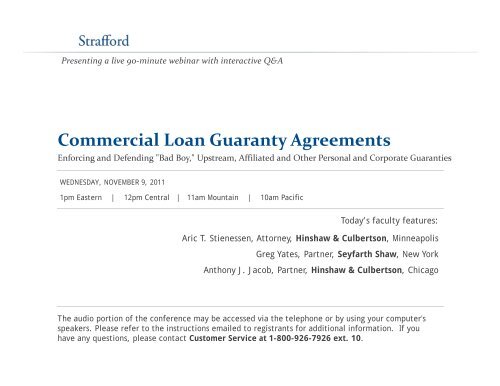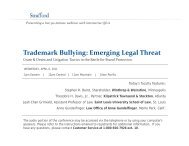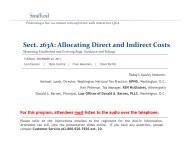Commercial Loan Guaranty Agreements - Strafford
Commercial Loan Guaranty Agreements - Strafford
Commercial Loan Guaranty Agreements - Strafford
Create successful ePaper yourself
Turn your PDF publications into a flip-book with our unique Google optimized e-Paper software.
Presenting a live 90‐minute webinar with interactive Q&A<br />
<strong>Commercial</strong> <strong>Loan</strong> <strong>Guaranty</strong> <strong>Agreements</strong><br />
Enforcing and Defending "Bad Boy," Upstream, Affiliated and Other Personal and Corporate Guaranties<br />
WEDNESDAY, NOVEMBER 9, 2011<br />
1pm Eastern | 12pm Central | 11am Mountain | 10am Pacific<br />
Td Today’s faculty features:<br />
Aric T. Stienessen, Attorney, Hinshaw & Culbertson, Minneapolis<br />
Greg Yates, Partner, Seyfarth Shaw, New York<br />
Anthony J. Jacob, Partner, Hinshaw & Culbertson, Chicago<br />
The audio portion of the conference may be accessed via the telephone or by using your computer's<br />
speakers. Please refer to the instructions emailed to registrants for additional information. If you<br />
have any questions, please contact Customer Service at 1-800-926-7926 ext. 10.
Conference Materials<br />
If you have not printed the conference materials for this program, please<br />
complete the following steps:<br />
• Click on the + sign next to “Conference Materials” in the middle of the left-<br />
hand column on your screen.<br />
• Click on the tab labeled “Handouts” that appears, and there you will see a<br />
PDF of the slides for today's program.<br />
• Double click on the PDF and a separate page will open.<br />
• Print the slides by clicking on the printer icon.
Continuing Education Credits<br />
FOR LIVE EVENT ONLY<br />
For CLE purposes, please let us know how many people are listening at your<br />
location by completing each of the following steps:<br />
• Close the notification box<br />
• In the chat box, type (1) your company name and (2) the number of<br />
attendees at your location<br />
• Click the SEND button beside the box
Tips for Optimal Quality<br />
Sound Quality<br />
If you are listening via your computer speakers, please note that the quality of<br />
your sound will vary depending on the speed and quality of your internet<br />
connection.<br />
If the sound quality is not satisfactory and you are listening via your computer<br />
speakers, you may listen via the phone: dial 1-866-871-8924 and enter your PIN -<br />
when prompted. Otherwise, please send us a chat or e-mail<br />
sound@straffordpub.com immediately so we can address the problem.<br />
If you dialed in and have any difficulties during the call, press *0 for assistance.<br />
Viewing Quality<br />
To maximize your screen, press the F11 key on your keyboard. To exit full screen,<br />
press the F11 key again.
<strong>Commercial</strong> <strong>Loan</strong><br />
<strong>Guaranty</strong> <strong>Agreements</strong><br />
Enforcing and Defending “Bad Boy,”<br />
Upstream, Affiliated and Other Personal and<br />
Corporate Guaranties<br />
November 9, 2011<br />
Aric T. Stienessen<br />
Anthony J. Jacob<br />
Greg Yates<br />
astienessen@hinshawlaw.com<br />
612-334-2504<br />
ajacob@hinshawlaw.com<br />
312-704-3105<br />
gyates@seyfarth.com<br />
212-218-3336
Presenters<br />
Aric T. Stienessen, Partner<br />
Hinshaw & Culbertson LLP, Minneapolis<br />
He represents lenders, investment banks and borrowers in commercial<br />
finance transactions. He also represents businesses and real property<br />
developers in sales and purchase transactions involving commercial<br />
real property, and handles transactions involving mergers,<br />
acquisitions, divestitures and corporate organization and governance.<br />
6<br />
6
Presenters<br />
Anthony J. Jacob, Partner<br />
Hinshaw & Culbertson, Chicago<br />
Mr. Jacob is engaged g in general corporate practice, including various<br />
aspects of private merger, acquisition, divestiture and employee<br />
benefit matters. In addition, Mr. Jacob’s practice includes secured and<br />
unsecured lending transactions, asset securitization and structured<br />
finance, ESOP loans, initial debt and equity offerings, primary and<br />
secondary debt offerings, corporate reorganizations and restructuring,<br />
joint ventures and syndicated commercial financing transactions. His<br />
clients include domestic and foreign corporations, limited it liability<br />
companies and partnerships, and banks and other lending institutions.<br />
7<br />
7
Presenters<br />
Greg Yates, Partner<br />
Seyfarth Shaw, New York<br />
A member of the Bankruptcy, Workouts & Reorganization Department,<br />
he is a trusted advisor to financial institutions as well as to noninstitutional<br />
lenders and investors. Mr. Yates’ national practice is<br />
concentrated in the area of debtor/creditor relations, including<br />
workouts, restructurings, and bankruptcy. A key focus of his practice is<br />
advising clients on creative solutions to distressed commercial real<br />
estate transactions and, if necessary, litigation relating to those<br />
transactions. ti In 2011, Mr. Yates was selected by the Turnaround<br />
Management Association as a recipient of its Transaction of the Year -<br />
Large Turnaround Award.<br />
8<br />
8
Outline<br />
I<br />
II.<br />
III. Bankruptcy Issues<br />
IV. Questions and Answers<br />
I. Overview of General Types of Guaranties<br />
General Legal Issues to Enforce and Defend Guaranties<br />
9<br />
9
I. Overview of General Types of Guaranties<br />
• The <strong>Guaranty</strong> Agreement<br />
• A guaranty is an agreement made by a third party, whether a<br />
person, trust or a business entity, to pay and/or perform the<br />
obligations of a debtor for the satisfaction of a debt owed to a<br />
creditor upon the occurrence of an event, typically a default by<br />
the debtor under the original loan agreement.<br />
• A guaranty, like any contract, requires mutual assent, adequate<br />
consideration, definiteness and a meeting of the minds. Under<br />
most states’ Statute of Frauds, a guaranty must be in writing,<br />
signed by the guarantor(s) and delivered d to the creditor.<br />
1010
I. Overview of General Types of Guaranties<br />
• In the context of a loan transaction, a guaranty serves as a form<br />
of collateral to support the debt obligation between the debtor and<br />
the creditor.<br />
• But, the guaranty and the loan agreement evidence separate<br />
obligations, and their independence is not affected by the fact that<br />
both agreements are written on the same paper or instrument or<br />
are contemporaneously executed.<br />
• The guaranty cannot exist without a primary debt obligation. Thus,<br />
if the primary debt obligation has been fully satisfied, is void or is<br />
illegal, a guaranty of the debt obligation is also unenforceable.<br />
1111
I. Overview of General Types of Guaranties<br />
• Consideration<br />
• A guaranty is a contract and, as such, it must be supported by<br />
consideration. A guaranty without consideration is merely an<br />
unenforceable gratuitous promise. While some guaranties are founded<br />
on separate consideration than the original credit transaction, the<br />
guarantor need not receive a direct benefit for consideration to exist.<br />
The consideration usually consists of a benefit to the debtor or a<br />
detriment to the creditor.<br />
1212
I. Overview of General Types of Guaranties<br />
• Courts have deemed consideration to be sufficient in the following<br />
cases:<br />
• <strong>Guaranty</strong> is made contemporaneously with loan agreement. See, In re Kraft,<br />
LLC, 429 B.R. 637, 659 (Bankr.N.D.Ind. 2010); Jackson v. Luellen Farms, Inc.,<br />
877 N.E.2d 848 (Ind. Ct. App. 2007).<br />
• <strong>Guaranty</strong> is made as part of the loan transaction, even if the two documents are<br />
not executed on the same date. See, Michelin Management Co., Inc. v.<br />
Mayaud, 307 A.D.2d 280, 762 N.Y.S.2d 108 (2d Dep't 2003).<br />
• Amendment to the loan agreement, note or other loan document that is<br />
acknowledged and approved by the guarantor. See, First Commerce Bank v.<br />
Palmer, 226 S.W.3d 396 (Tex. 2007); Caves v. Columbus Bank & Trust Co.,<br />
589 S.E.2d 670, 676 (Ga.App. 2003); Brown v. Lawrenceville Properties, LLC,<br />
710 S.E.2d 682, 685 (Ga.App. 2011).<br />
1313
I. Overview of General Types of Guaranties<br />
• Resolution and/or settlement of claims against debtor; the creditor's<br />
compromise of a claim against the debtor. See, Cincinnati Ins. Co. v.<br />
American Hardware Mfrs. Ass'n, 898 N.E.2d 216, 230 (Ill.App. 1st Dist.<br />
2008); Tag to Print 3Tower Investors, LLC v. 111 East Chestnut<br />
Consultants, Inc., 864 N.E.2d 927, 937 (Ill.App. 1st Dist. 2007).<br />
• Continuance and/or expansion of debtor’s business with creditor or other<br />
vendors or service providers; the creditor's agreement to continue doing<br />
business with the primary debtor. See, Material Partnerships, Inc. v.<br />
Ventura, 102 S.W.3d 252 (Tex. App. 14th Dist. 2003).<br />
• Creditor’s agreement to conduct business with guarantor or to provide<br />
guarantor with a benefit outside of the guaranty agreement; a bank's<br />
retention of the guarantor's friend in his position as president of the bank.<br />
See, Performance Elec., Inc. v. CIB Bank, 864 N.E.2d 779, 784 (Ill.App. 1<br />
Dist. 2007).<br />
1414
I. Overview of General Types of Guaranties<br />
• Joint and Several Liability<br />
• Typically, with multiple guarantors of the same debt obligation,<br />
the creditor can proceed against less than all of the coguarantors<br />
for recovery of the entire guaranteed obligations.<br />
See Wachovia Bank, Nat. Ass'n v. Horizon Wholesale Foods,<br />
LLC, 2009 WL 3526662 (S.D.Ala. 2009); Finagin v. Arkansa<br />
Dev. Fin. Auth., 139 S.W.3d 797, 803 (Ark. 2003); Century<br />
Business Credit Corp. v. Gargiulo Foods, L.L.C., 2003 WL<br />
21998959 (S.D.N.Y.,2003).<br />
1515
I. Overview of General Types of Guaranties<br />
• Death of Guarantor<br />
• Unless expressly provided in the guaranty, a guarantor's death does<br />
not terminate a guaranty. See, In re Steagall's Estate, 444 N.E.2d 838<br />
(4th Dist. 1983); In re Klink's Estate, 35 N.E.2d 684 (1st Dist. 1941).<br />
The death of the guarantor of a continuing guaranty may limit the<br />
guarantor’s liability as it relates to future transactions but does not<br />
affect the credit transaction that was originally guaranteed. However,<br />
the estate of the deceased continues to guaranty a credit transaction<br />
by providing for renewals, as the consideration for the additional<br />
obligation that was extended before the guarantor's death.<br />
1616
I. Overview of General Types of Guaranties<br />
• Types of Guaranties<br />
• Absolute<br />
• An absolute guaranty provides that the guarantor promises to pay<br />
or perform the obligations of the debtor upon the occurrence of a<br />
default event (typically debtor’s default). If a guaranty does not<br />
contain words of limitation or conditions, it is typically construed as<br />
an absolute guaranty.<br />
• Conditional<br />
• A conditional guaranty requires the happening of some contingent<br />
event (other than the default of the debtor) or the performance of<br />
some act on the part of the creditor before the guarantor will be<br />
liable.<br />
1717
I. Overview of General Types of Guaranties<br />
• Payment<br />
• A payment guaranty obligates the guarantor to pay the debt at maturity<br />
(which may arise due to an event of default). Upon the occurrence of a<br />
debtor's default, the guarantor’s obligation becomes fixed and the<br />
creditor does not need to make a demand on the debtor.<br />
• Collection<br />
• A guaranty of collection is a guarantor’s promise that if the creditor<br />
cannot collect the claim with due diligence, usually after suit (and<br />
exhaustion of remedies) against the debtor, the guarantor will pay the<br />
creditor.<br />
• Performance<br />
• A performance guaranty obligates the guarantor to perform some<br />
obligation on behalf of the debtor for the benefit of the creditor.<br />
1818
I. Overview of General Types of Guaranties<br />
• Continuing<br />
• A guaranty is continuing when it is not limited to a single transaction<br />
but contemplates a future course of dealing which may encompass a<br />
series of transactions, may be for an indefinite period and/or may be<br />
intended to secure payment or performance of an overall debt of the<br />
debtor. As such, a continuing guaranty may include subsequent<br />
indebtedness without new consideration.<br />
• Restricted<br />
• A guaranty is a restricted guaranty when it is limited to a single or<br />
limited number of transactions, to a certain part of the debt obligation<br />
and/or to a certain period of time.<br />
1919
I. Overview of General Types of Guaranties<br />
• Downstream<br />
• A downstream guaranty is a guaranty by a parent corporation for the<br />
obligations of its subsidiary. In this scenario, a lender will look to the<br />
parent corporation to back up the debt of a subsidiary corporation due<br />
to the parent corporation’s superior assets and financial condition.<br />
• Upstream<br />
• An upstream guaranty is a guaranty by a subsidiary corporation for the<br />
obligations of its parent corporation. Typically, a creditor will require an<br />
upstream guaranty when debtor’s, i.e. the parent corporation’s, only<br />
assets are the stock of a subsidiary, and the subsidiary owns assets<br />
used as collateral to secure the credit obligations.<br />
• Cross-stream<br />
• A cross-stream guaranty is a guaranty among affiliated corporations,<br />
whose stock are both owned by the same parent.<br />
2020
I. Overview of General Types of Guaranties<br />
• “Bad Boy” <strong>Guaranty</strong><br />
• Many non-recourse guaranties will include provisions that carve-out<br />
instances where the guarantor may be personally liable upon the<br />
occurrence of certain enumerated bad acts. This type of guaranty is<br />
referred to as a “bad boy” guaranty. The types of bad acts commonly<br />
include matters such as fraud, misappropriation, waste, and other acts<br />
that show some bad act on the part of the guarantor. Since the<br />
guarantor’s personal liability arises only upon the occurrence of a bad<br />
act, the guaranty’s liability is sometimes referred to as a springing<br />
liability.<br />
2121
II. Enforcement and Defense of Guaranties<br />
• Capacity<br />
• Delaware Corporations – General Power<br />
• “(a) In addition to the powers enumerated in § 122 of this title, every<br />
corporation, its officers, directors and stockholders shall possess<br />
and may exercise all the powers and privileges granted by this<br />
chapter or by any other law or by its certificate of incorporation,<br />
together with any powers incidental thereto, so far as such powers<br />
and privileges are necessary or convenient to the conduct,<br />
promotion or attainment of the business or purposes set forth in its<br />
certificate of incorporation.<br />
• (b) Every corporation shall be governed by the provisions i and be<br />
subject to the restrictions and liabilities contained in this chapter.”<br />
8 Del.C. § 121<br />
2222
II. Enforcement and Defense of Guaranties<br />
• Capacity<br />
• Delaware Limited Liability Companies – General and Specific <strong>Guaranty</strong> Power<br />
• “(b) A limited liability company shall possess and may exercise all the<br />
powers and privileges granted by this chapter or by any other law or by its<br />
limited it liability company agreement, together th with any powers incidental id thereto, including such powers and privileges as are necessary or<br />
convenient to the conduct, promotion or attainment of the business,<br />
purposes or activities of the limited liability company.<br />
• (c) Notwithstanding any provision of this chapter to the contrary, without<br />
limiting the general powers enumerated in subsection (b) of this section, a<br />
limited liability company shall, subject to such standards and restrictions, if<br />
any, as are set forth in its limited liability company agreement, have the<br />
power and authority to make contracts of guaranty and suretyship and enter<br />
into interest rate, basis, currency, hedge or other swap agreements or cap,<br />
floor, put, call, option, exchange or collar agreements, derivative<br />
agreements, or other agreements similar to any of the foregoing.”<br />
6 Del.C. § 18-106<br />
2323
II. Enforcement and Defense of Guaranties<br />
• Capacity<br />
• Delaware Corporations – Specific <strong>Guaranty</strong> Power<br />
• “Every corporation created under this chapter shall have power to:<br />
a. (13) Make contracts, including contracts of guaranty and suretyship, incur liabilities,<br />
borrow money at such rates of interest t as the corporation may determine, issue its<br />
notes, bonds and other obligations, and secure any of its obligations by mortgage,<br />
pledge or other encumbrance of all or any of its property, franchises and income,<br />
and make contracts of guaranty and suretyship which are necessary or convenient<br />
to the conduct, promotion or attainment of the business of (a) a corporation all of<br />
the outstanding t stock of which h is owned, directly or indirectly, by the contracting<br />
ti<br />
corporation, or (b) a corporation which owns, directly or indirectly, all of the<br />
outstanding stock of the contracting corporation, or (c) a corporation all of the<br />
outstanding stock of which is owned, directly or indirectly, by a corporation which<br />
owns, directly or indirectly, all of the outstanding stock of the contracting<br />
corporation, which contracts of guaranty and suretyship shall be deemed to be<br />
necessary or convenient to the conduct, promotion or attainment of the business of<br />
the contracting corporation, and make other contracts of guaranty and suretyship<br />
which are necessary or convenient to the conduct, promotion or attainment of the<br />
business of the contracting corporation;”<br />
8 Del.C. § 122<br />
2424
II. Enforcement and Defense of Guaranties<br />
• Statute of Frauds<br />
• Mistake<br />
• Misrepresentation<br />
• Parol Evidence<br />
• Interpretation<br />
2525
II. Enforcement and Defense of Guaranties<br />
• Impossibility, Impracticability, and Frustration of<br />
Purpose<br />
• Accord and Satisfaction<br />
• Novation<br />
• Statute of Limitations<br />
• Lack of Notice of Adverse Effects<br />
2626
II. Enforcement and Defense of Guaranties<br />
• Material Change in Debt and Impairment of Collateral – UCC 3-605<br />
• “(a) If a person entitled to enforce an instrument releases the obligation of a principal<br />
obligor in whole or in part, and another party to the instrument is a secondary obligor with<br />
respect to the obligation of that principal obligor, the following rules apply:<br />
• (1) Any obligations of the principal obligor to the secondary obligor with respect to any<br />
previous payment by the secondary obligor are not affected. Unless the terms of the<br />
release preserve the secondary obligor's recourse, the principal obligor is discharged,<br />
to the extent of the release, from any other duties to the secondary obligor under this<br />
article.<br />
• (2) Unless the terms of the release provide that the person entitled to enforce the<br />
instrument retains the right to enforce the instrument against the secondary obligor, the<br />
secondary obligor is discharged to the same extent as the principal obligor from any<br />
unperformed portion of its obligation on the instrument. If the instrument is a check and<br />
the obligation of the secondary obligor is based on an indorsement of the check, the<br />
secondary obligor is discharged without regard to the language or circumstances of the<br />
discharge or other release.<br />
• (3) If the secondary obligor is not discharged under paragraph (2), the secondary<br />
obligor is discharged to the extent of the value of the consideration for the release, and<br />
to the extent that the release would otherwise cause the secondary obligor a loss.<br />
2727
II. Enforcement and Defense of Guaranties<br />
• Material Change in Debt and Impairment of Collateral – UCC 3-605<br />
• (b) If a person entitled to enforce an instrument grants a principal obligor an extension of<br />
the time at which one or more payments are due on the instrument and another party to the<br />
instrument is a secondary obligor with respect to the obligation of that principal obligor, the<br />
following rules apply: ppy<br />
• (1) Any obligations of the principal obligor to the secondary obligor with respect to any<br />
previous payment by the secondary obligor are not affected. Unless the terms of the<br />
extension preserve the secondary obligor's recourse, the extension correspondingly<br />
extends the time for performance of any other duties owed to the secondary obligor by<br />
the principal i obligor under this article.<br />
• (2) The secondary obligor is discharged to the extent that the extension would<br />
otherwise cause the secondary obligor a loss.<br />
• (3) To the extent that the secondary obligor is not discharged under paragraph (2), the<br />
secondary obligor may perform its obligations to a person entitled to enforce the<br />
instrument as if the time for payment had not been extended or, unless the terms of the<br />
extension provide that the person entitled to enforce the instrument retains the right to<br />
enforce the instrument against the secondary obligor as if the time for payment had not<br />
been extended, treat the time for performance of its obligations as having been<br />
extended correspondingly.<br />
2828
II. Enforcement and Defense of Guaranties<br />
• Material Change in Debt and Impairment of Collateral – UCC 3-<br />
605<br />
• (c) If a person entitled to enforce an instrument agrees, with or without<br />
consideration, to a modification of the obligation of a principal obligor other than<br />
a complete or partial release or an extension of the due date and another party<br />
to the instrument is a secondary obligor with respect to the obligation of that<br />
principal obligor, the following rules apply:<br />
• (1) Any obligations of the principal obligor to the secondary obligor with<br />
respect to any previous payment by the secondary obligor are not affected.<br />
The modification correspondingly modifies any other duties owed to the<br />
secondary obligor by the principal obligor under this article.<br />
• (2) The secondary obligor is discharged from any unperformed portion of its<br />
obligation to the extent that the modification would otherwise cause the<br />
secondary obligor a loss.<br />
• (3) To the extent that the secondary obligor is not discharged under<br />
paragraph (2), the secondary obligor may satisfy its obligation on the<br />
instrument as if the modification had not occurred, or treat its obligation on<br />
the instrument t as having been modified d correspondingly.<br />
2929
II. Enforcement and Defense of Guaranties<br />
• Material Change in Debt and Impairment of Collateral – UCC 3-<br />
605<br />
• (d) If the obligation of a principal obligor is secured by an interest in collateral,<br />
another party to the instrument is a secondary obligor with respect to that<br />
obligation, and a person entitled to enforce the instrument impairs the value of<br />
the interest in collateral, the obligation of the secondary obligor is discharged to<br />
the extent of the impairment. The value of an interest in collateral is impaired to<br />
the extent the value of the interest is reduced to an amount less than the<br />
amount of the recourse of the secondary obligor, or the reduction in value of the<br />
interest causes an increase in the amount by which the amount of the recourse<br />
exceeds the value of the interest. For purposes of this subsection, impairing the<br />
value of an interest in collateral includes failure to obtain or maintain perfection<br />
or recordation of the interest in collateral, release of collateral without<br />
substitution of collateral of equal value or equivalent reduction of the underlying<br />
obligation, failure to perform a duty to preserve the value of collateral owed,<br />
under Article 9 or other law, to a debtor or other person secondarily liable, and<br />
failure to comply with applicable law in disposing of or otherwise enforcing the<br />
interest in collateral.<br />
3030
II. Enforcement and Defense of Guaranties<br />
• Material Change in Debt and Impairment of Collateral – UCC 3-<br />
605<br />
• (e) A secondary obligor is not discharged under subsections (a)(3), (b), (c), or<br />
(d) unless the person entitled to enforce the instrument knows that the person is<br />
a secondary obligor or has notice under Section 3-419(c) that the instrument<br />
was signed for accommodation.<br />
• (f) A secondary obligor is not discharged under this section if the secondary<br />
obligor consents to the event or conduct that is the basis of the discharge, or<br />
the instrument or a separate agreement of the party provides for waiver of<br />
discharge under this section specifically or by general language indicating that<br />
parties waive defenses based on suretyship or impairment of collateral. Unless<br />
the circumstances indicate otherwise, consent by the principal obligor to an act<br />
that would lead to a discharge under this section constitutes consent to that act<br />
by the secondary obligor if the secondary obligor controls the principal obligor or<br />
deals with the person entitled to enforce the instrument on behalf of the<br />
principal obligor.<br />
3131
II. Enforcement and Defense of Guaranties<br />
• Material Change in Debt and Impairment of Collateral<br />
– UCC 3-605<br />
• (g) A release or extension preserves a secondary obligor's recourse if<br />
the terms of the release or extension provide that: t<br />
• (1) the person entitled to enforce the instrument retains the right to<br />
enforce the instrument against the secondary obligor; and<br />
• (2) the recourse of the secondary obligor continues as if the release<br />
or extension had not been granted.<br />
• (h) Except as otherwise provided in subsection (i), a secondary obligor<br />
asserting discharge under this section has the burden of persuasion<br />
both with respect to the occurrence of the acts alleged to harm the<br />
secondary obligor and loss or prejudice caused by those acts.<br />
3232
II. Enforcement and Defense of Guaranties<br />
• Material Change in Debt and Impairment of Collateral<br />
– UCC 3-605<br />
• (i) If the secondary obligor demonstrates prejudice caused by an impairment of<br />
its recourse, and the circumstances of the case indicate that the amount of loss<br />
is not reasonably susceptible of calculation or requires proof of facts that are<br />
not ascertainable, it is presumed that the act impairing recourse caused a loss<br />
or impairment equal to the liability of the secondary obligor on the instrument. In<br />
that event, the burden of persuasion as to any lesser amount of the loss is on<br />
the person entitled to enforce the instrument.”<br />
Unif.<strong>Commercial</strong> Code § 3-605<br />
3333
II. Enforcement and Defense of Guaranties<br />
• Change in Creditor<br />
• Lack of Notice of Foreclosure Sale<br />
• Failure to Conduct <strong>Commercial</strong>ly Reasonable Foreclosure Sale<br />
• Release of Co-guarantors<br />
• Negligent <strong>Loan</strong> Administration<br />
• Failure to Pursue the Underlying Debtor<br />
• Defense on the Underlying Debt<br />
• Bankruptcy Issues (ex. automatic stay and fraudulent<br />
conveyances)<br />
3434
III.<br />
Bankruptcy Issues<br />
• Springing (“Bad Boy”) Guaranties Generally Enforced<br />
By Bankruptcy Court<br />
• (See In re Extended Stay Inc., 418 B.R. 49 (Bankr. S.D.N.Y. 2009)<br />
aff’d in part by In re Extended d Stay Inc., 435 B.R. 139 (S.D.N.Y. 2010))<br />
• Bankruptcy Courts Will Typically Abstain from Hearing Springing<br />
<strong>Guaranty</strong> Actions Removed From State Court<br />
• Guarantors Must Have Waived Any Indemnity or Contribution<br />
Claims Against the Debtor<br />
• Potential for State Court <strong>Guaranty</strong> Action to be Stayed Under §105<br />
of Bankruptcy if Guarantor is “Integral” to Debtor Case and Action<br />
Would Significantly Limit Guarantor’s Participation In Bankruptcy<br />
3535
III.<br />
Bankruptcy Issues<br />
• Potential ti Fraudulent Conveyance Exposure<br />
• Most Risk for Upstream and Cross-Stream Guaranties<br />
• Intercorporate Guaranties Can Be Unwound In Bankruptcy<br />
Under:<br />
• Bankruptcy Code §548 (Guaranties Made Up to Two Years<br />
Before Filing), or<br />
• Under Bankruptcy Code §544 and the Uniform Fraudulent<br />
Transfer Act (UFTA) or the Uniform Fraudulent<br />
Conveyances Act (UFCA) (Typically, y Guaranties Made From<br />
Four to Six Years Before Filing)<br />
3636
III.<br />
Bankruptcy Issues<br />
• Inquiry is Typically Constructive Fraud<br />
• Under Bankruptcy Code §544 and the UFTA, the Test is<br />
Whether the Guarantor (Debtor) received “Reasonably<br />
Equivalent Value”<br />
• Under the UFTA, the Test is Whether the Guarantor (Debtor)<br />
Received “Fair Consideration”<br />
• Drafting Considerations<br />
• Net Worth <strong>Guaranty</strong><br />
• Savings Clause<br />
3737
III.<br />
Bankruptcy Issues<br />
• Risk of Separate Classification of Deficiency Claims in Bankruptcy<br />
Plan<br />
(See In re Loop, 442 B.R. 714 (Bankr. D. Ariz. 2010)<br />
• Bankruptcy Code §544 Requires that Substantially Similar Claims May Not Be<br />
Put Into Separate Classes to Gerrymander an Affirmative Vote to Confirm a<br />
Plan Under Bankruptcy Code §1129(b)<br />
• Some Bankruptcy Courts are Now Holding that Guaranteed Deficiency Claims<br />
are Different Than Other Unsecured Claims and Are Permitted to Be Separately<br />
Classified<br />
• Separate Classification May Result in Unsecured Creditors Voting in Favor of a<br />
Plan and the Debtor Being Able to Confirm a Cramdown Plan of Reorganization<br />
3838

















